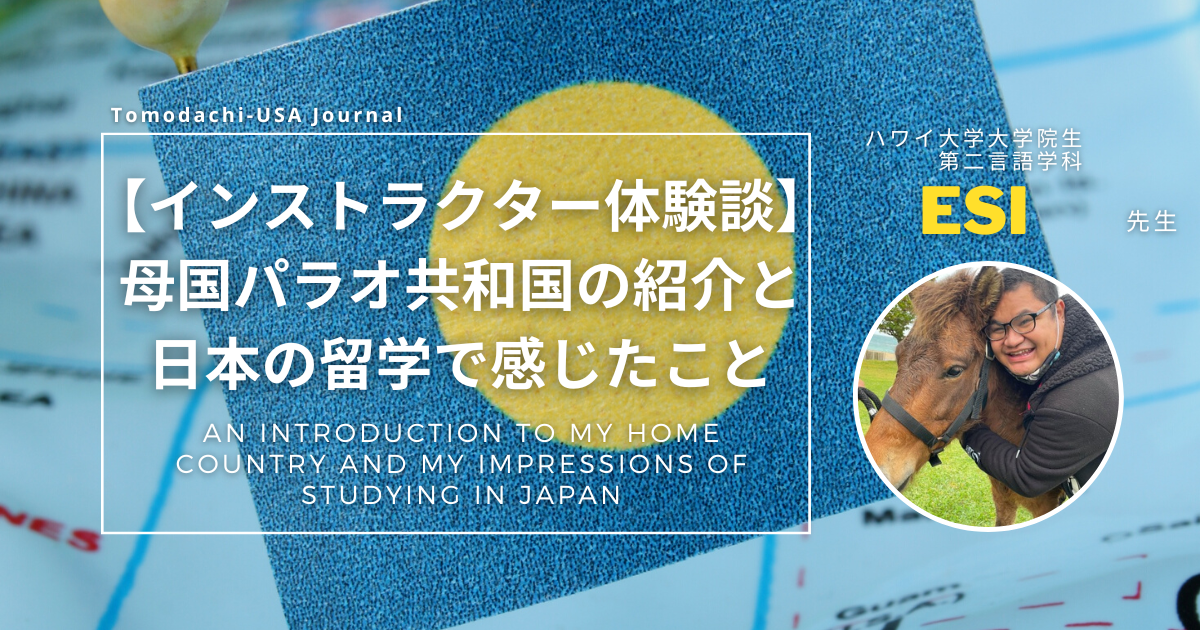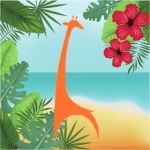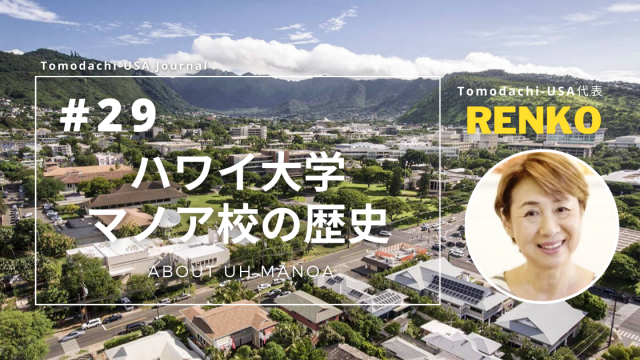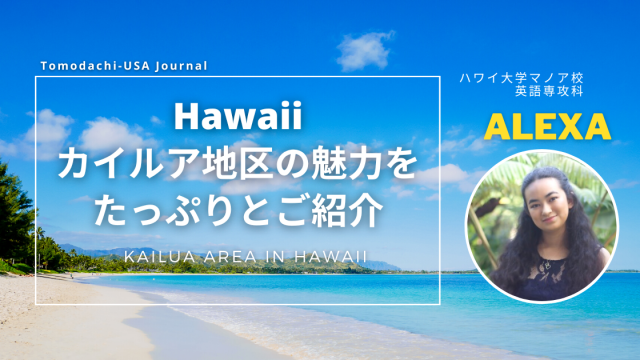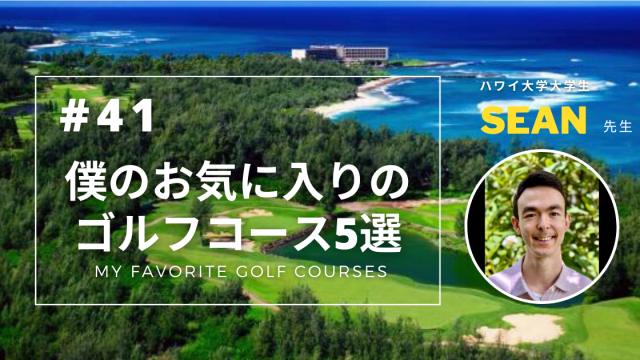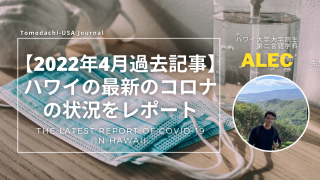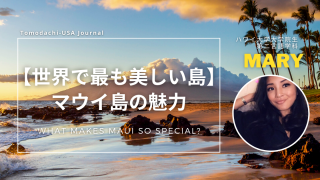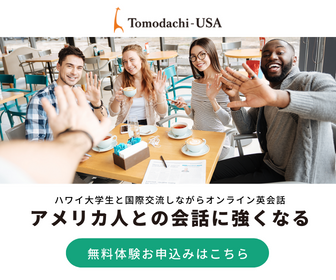今回は、Esi が母国パラオのことや日本での留学体験談を書いてくれました。以前パラオは日本領で、その後アメリカ領になったので、英語は日常語だそうです。他にも興味深いお話しが盛りだくさんです。
母国パラオのことや日本での留学体験談
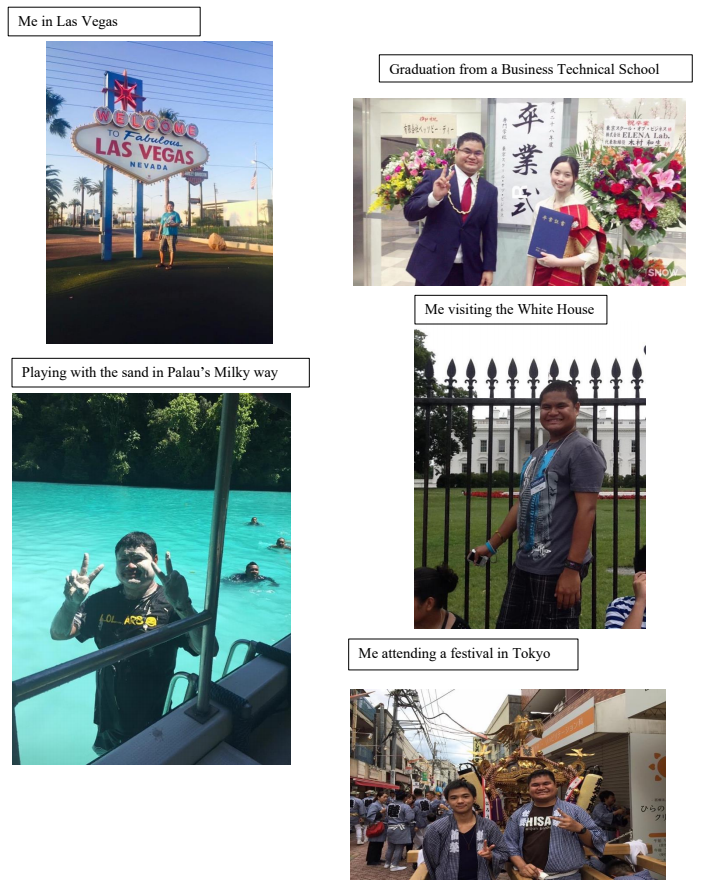
Hi this is Esi. I want to take this opportunity to introduce a little bit more about my country. The republic of Palau is a small island country in the Pacific Ocean. It was taken over by Japan in the early 1900s, and then the United States after World War II. Palau was under the US for a little over 50 years. In 1994, Palau became independent from the US and became its own country. However, Palau still has deep ties with the US even after declaring independence. Because of the long-term rule under the US, Palau adopted many things from it.
English is one of the main things that Palau adopted, including the government system was directly copied from the US government. Everything in Palau is in English, the news, TV programs, magazines, school textbooks, library books are all in English. Even during class, many of the classes are in English. The only time we use Palauan is when we talk to other Palauans. Holidays, such as thanksgiving, Christmas, and easter were adopted.
The school system especially with the school year is the same as the US. Palau still gets financial help from the US and even privileges that are not even available to other countries. Under the Compact of Free Association, Palauans such as myself can freely go to the US without visa. However, Japanese people also can visit the US without visa, the only difference is that I can live, work, and stay in USA for more than 90 days. In other words, I can freely live there without a working visa, the same as any other US citizen. The only difference is that I do not vote, and some US citizen privileges do not apply to me. The reason for this no visa privilege is the Compact of Free Associations Act. This allows not only Palauans but also many other Micronesian people to travel to the US freely without visa.
こんにちは。こちらは、エスィです。この機会に私の国のことを少し紹介したいと思います。パラオ共和国は、太平洋にある小さな島です。1900 年代の初めに日本に支配され、その後第二次世界大戦後にアメリカの領土になりました。パラオは、50 年以上、アメリカ領でした。1994 年にパラオはアメリカから独立し、自治国家になりました。しかし、パラオは独立宣言後もなおアメリカと強い絆を結んでいます。アメリカによる長い統治下で、パラオはアメリカから多くのことを取り入れました。政府の仕組みも直接アメリカを模倣しました。英語はパラオが取り入れた主たるものの一つです。パラオの全てが英語です。ニュースやテレビ番組、雑誌、学校の教科書や図書館の本全てが英語です。授業もほとんど英語で行われます。私たちがパラオ語を使うのは、他のパラオ人と話すときだけです。感謝祭やクリスマス、イースターのような休日が取り入れられました。学校の制度、特に学年はアメリカと同じです。パラオは、アメリカから財政支援をいまだに受けているし、他の国には、出来ないような特権も受けています。自由連合盟約の下に、私のようなパラオ人が自由にビザを持たなくてもアメリカに行くことができるんです。日本人もビザなしでアメリカを訪れることができますが、唯一の違いは、私は住むこともできるし、働くこともできる、そして 90 日以上アメリカに滞在できることです。言い変えると、私は、アメリカ市民と同じようにワーキングビザなしで自由にここで住むことができます。唯一の違いは、投票をしないことです。アメリカ市民に与えられているけれど私には与えられない特権もいくつかあります。このビザがいらない特権は、自由連合協定を結んでいるからです。この協定のため、パラオ人だけでなく、他の多くのミクロネシア人もビザなしで自由にアメリカを旅行することができるんです。
I have actually been to the US several times just for travel and to visit some of my relatives. I have been to Las Vegas, Washington DC, Pennsylvania, and New York. I have been to the White House, seen the liberty bell in Pennsylvania, and the Statue of Liberty in New York City. I’ve been to Hawaii, but only through transit at the airport. Hawaii is a very beautiful place with a beautiful unique culture. Guam, which is a territory for the US is just right next to Palau and is a regular destination for Palauans to go to for living, working, vacation, and even shopping. I have been there several times also to visit relatives. My eldest sister went to a university in Guam for 4 years. My second eldest sister is currently living in Texas as a healthcare worker for the elderly.
実際に、私は数回アメリカに旅行したことがありますし、親戚を尋ねたりもしています。ラスベガス、ワシントン DC、ペンシルベニアやニューヨークにも行ったことがあります。ホワイトハウスや、ペンシルベニアの自由の鐘を見たことがあります。また、ニューヨークの自由の女神も見ました。空港に立ち寄っただけですが、ハワイにも行ったことがあります。ハワイは、美しいユニークな文化を持ったとても素敵な場所です。アメリカ領のグアムは、ちょうどパラオの隣にあってパラオ人にとっては、住んだり、働いたり、バケーションやショッピングに行ったりする普通に行く場所になっています。私も親戚を尋ねて何回かそこへ行ったことがあります。私の一番上の姉は 4 年間グアムの大学へ行きました。私の二番目の姉は、老人のヘルスケア-ワーカーとして、今テキサスに住んでいます。
Many Palauans either join the US military after high school or go to the US for higher education. Many of my relatives are living in the US with their own families. Their children were born there so they have US citizenship and many of them have not been to Palau in many years or at all. I plan to move there, most likely Hawaii since I will be able to use Japanese there. Which brings me to my next topic of why I came to Japan instead of the US. My great grandfather is actually Japanese and after my grandfather passed away, we lost all ties with my Japanese relatives. I want to look for them, but Covid-19 is not helping me at all. On top of that, I wanted to know more about the Japanese culture and how it is to live in Japan. Studying here is one way to really emerge myself in the Japanese society and so I took the chance and here I am.
パラオ人には、高校卒業後にアメリカ軍隊に入隊したり、高等教育を受けるためにアメリカに行く人がたくさんいます。私の親戚も家族と一緒にアメリカに住んでいる人がたくさんいます。彼らの子供がそこで生まれると、その子供はアメリカの市民権を取得し、何年も又は全くパラオに行ったことがない人も多いです。私はアメリカに移り住む予定ですが、日本語が使えるのでハワイに引っ越そうと思っています。次にお話ししたいことは、私がなぜアメリカではなく日本に来たかということです。実は、私の祖父は日本人です。祖父が亡くなってから、私たちは、日本の親戚とのつながりが途絶えてしまいました。私は日本の親戚を探したいんです。しかし、コロナでそれができていません。さらに、私は日本の文化や日本に住むとはどういうことなのかをもっと知りたかったんです。ここで学ぶことは、日本の社会を理解する一つの方法です。そこで、このチャンスを生かして今ここに私がいるのです。
Before coming here, I already had an image of Japan as this high tech, respectful, hardworking country. When I arrived in Japan, I experienced more than just that. The respect for not only people but also for nature, the amazing food that goes beyond sushi and ramen, the amazing business ethics, and manners, all of these really opened my eyes to the country that is Japan. The Japanese way of business is the most intriguing feature of Japan that prompted me to learn business here. To be able to utilize the Japanese way of doing business outside of Japan would be a huge advantage for me.
日本に来る前、日本はハイテクで人々は尊敬し合い、よく働く国だというイメージを持っていました。私は、日本に来てそれ以上のものを経験しました。人への尊敬だけでなく自然への敬意、寿司やラーメンを超える素晴らしの食べ物、驚くべき企業倫理やマナー、これらすべてのものが日本という国に私の目を開かせました。日本式のビジネスは、ここ日本でビジネスを学ぶ私にとって一番興味深い特徴です。日本の外で日本式のビジネスを行うことは私にとってとても有利なことです。
A little fun fact, because Japan took over Palau, many Japanese culture integrated with the Palauan way of life. Music such as Enka, food such as Oshiruko, words such as Emongake remained in the Palauan daily life.
Also, because Japan’s main food is rice and seafood, it is actually very easy for me to live in Japan as it has the same food culture as Palau. Palau adopted rice as a staple food after the colonization from Japan. Sashimi, tempura, and udon are also eaten regularly in Palau.
少し面白いことですが、日本はパラオを支配していたので、たくさんの日本文化がパラオの生活様式に溶け込みました。演歌という音楽、お汁粉という食べ物、えもんがけという言葉はパラオ人の日常生活に残っています。また、日本の主食は米と魚なので、パラオでも同じ食文化だから、私はとても日本で住みやすいです。パラオは日本の植民地時代の後も、米を主食として取り入れました。刺身、てんぷら、うどんはパラオでも普通に食べられています。

Challenge the unknown world!未知の世界とつながろう!
Tomodachi-USAは、ハワイ大学の現役大学生(または卒業生)インストラクターと実践で英語を学びながら、外国人の友達を作り、人生の可能性を広げていくためのオンライン英会話サイトです。
ハワイに住むインストラクターとの国際交流を通して、「先生と生徒」の関係ではなく、「一生付き合える仲の良いお友達」の関係を築き、お互いの人生をより豊かにしていくことを目指しています。
実際に、これまで多くのTomodachi-USA会員様が、オンライン英会話レッスンの枠を超えて、旅行先のハワイや日本でインストラクターとの交流を楽しんでいます。
海外に友達が一人いるだけで、旅行が楽しくなったり、視野が広くなったり、今後の人生が大きく変わります。
「ただ英語を学ぶだけではつまらない」「身に付けた英語を使ってみたい」と思っている方のための交流の場所です。
Tomodachi-USAは、みなさんと未知の世界をつなぐ小さなきっかけになれることを心から祈っています。
私たちと一緒に未知の世界にチャレンジしてみませんか?
Tomodachi-USA事務局へのお問合せ
Email: tomodachi-usa1@tomodachiusa

